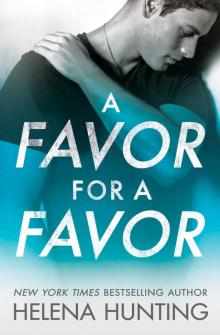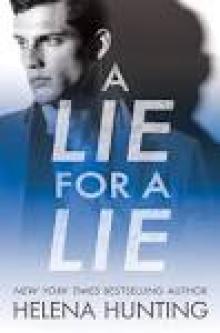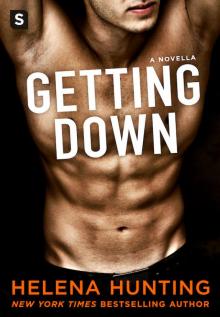- Home
- Hunting, Helena
Love Next Door Page 2
Love Next Door Read online
Page 2
“Okay, Dad, I’ll come home.”
CHAPTER 2
SMALL-TOWN WOES
Dillion
Two days later I’m behind the wheel of a rented U-Haul, driving the contents of my apartment back to the town I grew up in and swore I’d never live in again. I remind myself that this is temporary—that I’m only going to be here as long as my family needs my help, and then I’ll move back to the city. I’ll have time to job hunt without the pressure of taking just any job. At least that is what I’m telling myself.
I pass the old, worn sign that marks the beginning of Pearl Lake. YOUR DREAMS ARE A BOAT RIDE AWAY is written underneath in fancy cursive with a small, wilted-looking garden surrounding the base of the sign. The summer’s barely begun, and we’re already having one of those nasty heat waves. The grass has taken on the hue that’s typically referred to as “August gold,” everything dry and brown and brittle. We obviously need a good dose of rain soon, or there won’t be any bonfires happening on the beach. The trees lining the sides of the paved road are lush and green and full. Sporadic driveways create breaks in the tree line, with sleepy little cottage-style homes tucked inside them. It’s the opposite of Chicago, and every time I visit, I can’t wait to get back to the hustle and bustle of the city.
I turn onto the main road leading into town, shifting gears as I climb the steep hill, gravel spitting under my tires. When I reach the top, I downshift and take a moment to appreciate the view of the lake. It’s completely unobstructed at the highest point. The beautiful, clear, deep-blue water is surrounded by the same lush trees and evergreens. To the right are massive estate-style lake homes rising up above the landscape. Their presence is a reminder of all the things I aspired to as a teenager. I wanted to be on the other side, to have all the things they did.
Sandy artificial beaches lead into the water; boathouses and expensive water toys are tied to docks; trampolines and floating mats dot the water. Jet Skis and speedboats cut lines through the lake, toy-size in the distance. For the people on that side of the lake, their time here is an escape from their busy lives rather than their normal. I envied their ability to leave Pearl Lake when I was young.
The left side is far less opulent. A span of beach, with darker sand and fuller trees, fills up one corner, and the rest is lined with trees, with small narrow docks and tin boats dotting the water. And smack in the middle is Bernie’s house, the great divide between the rich and the moderately average townies, which is what the locals called themselves.
I exhale a breath as I head down the steep decline, veering left toward the downtown area so I can stop and pick up my mom on the way to the house. I timed the trip so I’ll arrive right as her shift ends.
I turn onto Main Street and pass the eye roll–inducing stores frequented by the more affluent members of the community—high-end furniture stores and water-toy rental places; a couple of nicer restaurants owned by city people; Indulgence, the overpriced ice cream and chocolate store I always secretly wanted to go to but couldn’t bring myself to because it would mean that I was taking business away from Corbin’s convenience store, which was owned by one of my dad’s friends.
I pull into the town parking lot and back my monster of a moving van into one of the spaces at the edge. I’m slapped with muggy June air as soon as I open the door and hop down onto the pitted pavement.
A group of teenagers from the rich side of the lake are draped across the ancient picnic table beside the equally ancient food truck. The same one I used to work at when I was their age. It was probably one of my most and least favorite jobs. I smelled constantly of stale french fries that summer. But it was a job, and money in my bank account. It was also the last summer I spent in Pearl Lake.
A teenage girl with long blonde hair pulled up into a high ponytail leans out the window while one of the summer boys flashes his perfect straight-toothed smile at her. Memories, some fond, some not, bubble to the surface.
Those summer boys were always so polished. Entitled and privileged, aware they had more and were better off than those of us who grew up in a small town, isolated and insulated. And in some ways, I bought into their narrative—their arrogant demeanor made my friends swoon. Local boys either cowered or puffed out their chests and looked down at those rich kids because they had more money and never had to work to earn it. Not like the townie kids, whose parents ran the local shops, catering to the people who came here for a few weeks or months of the year and then left everything behind again.
We were servants of the affluent. We lived outside the snow globe of entitlement. Close enough to shake it up, watch the chaos we caused, and then set that pretty picture-perfect world aside to collect dust until next season.
I pass the food truck and cross the street, heading for Tom’s Diner, where my mom has worked for as long as I can remember. As a teen I used to pick her up from work all the time. Never my brother, though, because he wasn’t very reliable, and half the time he didn’t have car privileges. Seems like not much has changed.
I brace myself as I peer through the frosted glass, taking in the tables and people sitting at them. The diner is mostly frequented by older townies or the summer teens from the rich side of the lake. Townie teens tend not to eat there, favoring the food truck for the cheaper food and the lack of adult and parental supervision.
I open the door, the bell above me tinkling softly. A few heads turn as I step inside the air-conditioned diner and let the door fall closed behind me, the puff of hot, humid air following me in. I shiver as the heat is eaten up and absorbed by the cool blast coming from the vent above my head.
“Darlin’!” my mom exclaims from her spot behind the counter.
She wipes her hands on her apron and slides behind one of the other servers, who is punching in an order at the computerized register. It must be an upgrade since I was last here. The girl at the computer turns toward the door, her expression registering shock as her gaze slides over me. She’s vaguely familiar, and it takes me a few moments to realize she’s Claire, the youngest sister of one of the girls I used to hang out with in high school but lost touch with after I moved to the city. More like ghosted on my part, which makes being back here that much more challenging.
Familiar faces line the counter, townies who eat at the diner on a regular basis, some of whom come for breakfast and don’t leave until the same time my mom’s shift ends in the afternoon, drinking coffee and using the place like it’s their own personal living room, not an actual diner.
“My baby is home!” My mom throws her arms around my neck, and I stumble forward a step. She’s several inches shorter than me, and I’m wearing heels—admittedly not the best choice for driving a U-Haul, but old habits apparently die hard. They’re also a bit of rebellion, signifying my reluctance to return to the place I only ever planned to visit for holidays.
Other than being several inches taller than her, I’m pretty much a carbon copy of my mom. We have the same unruly, curly blonde hair, pale-green eyes, button nose, and full lips. We both have overactive metabolisms, which means keeping meat on our bones is basically impossible.
She grabs my hand and drags me toward the counter, lined with red vinyl-covered stools, and pats the top of a free one. “Sit down, I’m just cashing out. Can I get you anything? A cup of coffee? How about a slice of pie? The Fetterlys dropped off a batch of their strawberry rhubarb custard pies. You know the ones with the crumble topping? How ’bout a slice of that?”
As much as I want to say no, because I’d rather get the heck out of here and away from all the familiar faces and the inevitable gossip, the Fetterlys’ pie is the best in the county, winning awards every year at the fall fair. Besides, I sort of feel like eating my feelings.
“Maybe you could pack me up a slice? I had lunch on the way here.” It’s not a complete lie. I ate an entire bag of trail mix on the drive from the city. It’s more that I don’t want to get sucked into conversations with people I haven’t seen in years who will want to
talk about what happened with my brother and ask questions about me.
“Sure, of course. Just coffee, then.” My mom slips back behind the counter and quickly sets a mug down by the stool, the only one not yet taken. She pours a steaming cup of fresh coffee while I drop down next to Rudy Dunn, who also happens to own the food truck across the street. Or at least he did.
My mom tops up his coffee and then goes back to cashing out.
“Well, if it isn’t little Dillion Stitch. Ya done growed up, didn’t ya?”
“Seems that way. Still running the food truck?”
“Sure am. Got my niece working there this summer. Brings in all those teen boys from the other side of the lake. Same as that summer you worked the truck. Gotta keep a close eye on things, but can’t say it’s bad for business, ya know? She’s nicer to look at than this old mug.” His grin is missing a couple of teeth at the edge of his smile line.
I return the smile. I remember exactly what it was like when those summer boys would show up in their flashy cars, or on their new ATVs. They’d hang out near the picnic table, flash their flawless smiles, and flirt shamelessly. They were always trying to hook up with the local girls, almost like it was some kind of game for them. But when they showed up on our side of the lake for parties, it was their turn to learn their place in this town.
One time I kissed a summer boy on the beach to get back at my on-again, off-again boyfriend, who had decided we needed a break.
It had been the kind of kiss to sink into, at least until someone had made a “trailer trash” comment. That didn’t go over well. At the time, townies didn’t like it when one of the summer boys took advantage of their own or, worse, point out how much less they thought of us. Fights happened, and townies didn’t care about broken noses or scars. I’d left the beach as soon as the fists started flying, not wanting to deal with the embarrassment or humiliation. I’m not sure how much has changed in the years I’ve been gone, based on who was sitting by the food truck when I passed it.
Rudy and I make small talk—mostly me asking questions about his family, his boat, what kind of fish he’s been catching so far this season—in an effort to keep the topic off Billy and me.
Claire passes by with the coffee two minutes in and gives me a stiff smile. “Can I top you up, Dillion?”
I cover the top of my mug with my hand. “I’m okay, thanks. How are you?” I’m struck by a sharp pang of guilt. All these people I spent my childhood with I left behind, sloughed off like snakeskin. I never looked back, either, desperate to escape small-town life.
“I’m good.” Claire holds out her left hand and splays her fingers, a small diamond glinting in the light. “Got engaged to Tommy Westover last month. We’re gonna get married next summer in my parents’ backyard.”
“Oh wow! Congratulations! That’s wonderful.” I remember Tommy Westover. He graduated the year below me, played football for the school team, had two older brothers.
“Thanks.” Her smile is softer now. “He’s managing the hardware store. Took over ’cause Harry wanted to go down to part time, being retirement age and all. I might start doing the books or something after we’re married.” The bell at the kitchen window dings, and she glances over her shoulder. “Anyway, it’s nice to see you, Dillion. Maybe we’ll see you around, if you’re in town for a while.”
I swallow down the awkwardness and smile. “Absolutely.”
She nods and turns to the kitchen window, balancing plates along her forearms so she only has to make one trip.
Thankfully my mom is finished cashing out, which means we can skedaddle before I run into any more blasts from the past. I follow her out the door, and when we get to the U-Haul van, I realize as my mom hops into the passenger seat that once I return it, I won’t have a car. I’m used to living in the city, where I didn’t need to own one. Hopefully my dad will have a work truck I can use.
“How was the drive down? Traffic okay?” Mom smooths out her skirt and crosses her legs. She clasps her hands in her lap, and I assume it’s to avoid fidgeting. My relationship with my mom hasn’t been particularly easy. I love her and she’s a great mom, but my life goals and hers are not the same. She’s never once been to Chicago, happy living in her little bubble where nothing ever changes. We get along well enough, but she doesn’t understand my desire for more. She likes the simple life, and I like the city.
“Once I was out of the city, it was smooth sailing. How are things? How’s Billy?”
“Oh, you know your brother; he’ll be fine. It’s not like anyone was hurt.”
I glance briefly at her. “He was driving drunk, Mom.”
“It was two in the morning. The only thing he was at risk of harming was a deer and himself.”
“He drove into the McAlisters’ mailbox! What if it had been their house?” Leave it to my mom to downplay a drinking-and-driving accident.
Mom scoffs. “They’re fifty feet back from the road; he’d have had to hit a lot of trees on the way through to make that happen. Anyway, he’s learned his lesson. It won’t happen again, especially since he can’t drive for the next few months.”
“Dad said Bernie was going to try to get it down from a year to six months.”
“It’ll be reduced. And he’ll be able to catch a ride in to work with your dad until all of that is sorted out. Anyway, enough about that.” Mom doing what she does best when it comes to my brother—deny, avoid, and change the subject. “Did Claire tell you she’s marrying the youngest Westover boy? He’s such a nice young man. And they’re having the wedding in the Bells’ backyard. At least that’s the plan. They’re going to have a pig roast. Don’t you think that’s lovely?”
I leave the Billy conversation alone for now. I’ll be seeing him soon enough, and hopefully my dad will have the full story. “It sounds great, Mom.”
“I’m sorry things didn’t work out with that Jackson boy you were dating. It’s too bad we were never able to meet him.”
“His name is Jason, and we just had different life plans, is all.” I bite my tongue so I don’t say what I want to, which is that they could’ve met him if they’d come up to visit even once. I never brought him home because . . . well, there wasn’t anywhere for him to stay in our little three-bedroom house, and he went home to his family during the holidays. They at least made the effort to come see us in the city a few times.
“Mmm.” My mom nods and does some more skirt smoothing. “I honestly half expected the two of you to get engaged. You’ll find the right person, someday.” She pats my arm and gives me a small smile.
“I’m sure I will.” And whoever that someone is, I doubt I’m going to find him in Pearl Lake.
We pass familiar driveways lined with tin mailboxes, some prettily decorated, others seeming like they’re about to fall off. Our driveway has a mailbox that looks like a miniature house. My mom repaints it every year with a new design. This year’s is a cute white home with a red roof and flower boxes lining every window.
I turn down the gravel drive lined with trees and pull up to the old, worn-down house that’s more like a typical cottage for this side of the lake. My dad constantly has a project on the go, a renovation he’s trying to tackle in his spare time, which admittedly he’s never had much of. Based on the scaffolding that surrounds it, he’s repointing the brick on the chimney. The wood siding has been restained on the right side but is still aged and faded on the left. I love it and loathe it in equal measure.
“Your dad cleared a space in the garage for all your things, and he’ll help you unload when he gets home tonight. I’m sure you want to return the van so you’re not paying all those rental fees.” My mom hops out, her tennis shoes hitting the gravel with a low crunch.
I gingerly step out, my heels highly impractical for small-town, rural living. I resign myself to the fact that I’m going to have to put these in storage with the majority of my stuff. I also have to get my head around living with my parents again. At the age of twenty-eight.
> “Your dad renovated the kitchen this spring! I can’t wait to show you!” She motions for me to follow her. I drop the keys into my purse and don’t bother locking the truck. No one steals from their own community around here.
I follow my mom into the house. The front foyer is small, a closet to the left, a small bench to the right. Past that is the kitchen.
“Well?” She smiles brightly, her excitement obvious. “What do you think? Doesn’t it look great? Obviously it’s not all new stuff, but they did this renovation on a cottage on the north side—you know, where all the rich folk live.” She waves a hand in the air, like the explanation is silly. “Anyway, the owner said your dad could take whatever he wanted. Can you believe it? The kitchen was almost brand new!”
The cabinets look like they’re maybe a few years old—white Shaker style with simple lines. It’s a huge improvement to the nineties-era kitchen I grew up with. The highly modernized kitchen is beautiful, but it also showcases how dated the rest of the house is. Still, I can recognize why she’s excited by it. “It’s great, Mom!”
The dining room, which is beside the kitchen, boasts an eighties-style table and wooden chairs with a geometric pattern—designs that have been made popular again thanks to the show Stranger Things. Beyond that is the living room, where my brother lies stretched out on the black leather sofa that’s so worn in places that the wooden frame peeks through.
He takes up the entire couch, his long, lean frame barely fitting the length, with his casted leg, propped up with a pillow, dangling over the edge by about six inches. He’s currently watching an episode of Garage Wars, nursing a beer. On the coffee table next to him is the remote and a bottle of prescription pills.
I bite my tongue, because coming in guns blazing, trying to parent my brother three seconds after I’ve arrived, is only going to cause problems I don’t need. Especially if I have to live in the same space with him for the foreseeable future.

 PUCKED LOVE
PUCKED LOVE A KISS FOR A KISS
A KISS FOR A KISS Making Up
Making Up Handle with Care
Handle with Care A Favor for a Favor
A Favor for a Favor A Secret for a Secret
A Secret for a Secret Love Next Door
Love Next Door A Lie for a Lie
A Lie for a Lie I Flipping Love You
I Flipping Love You Getting Down
Getting Down